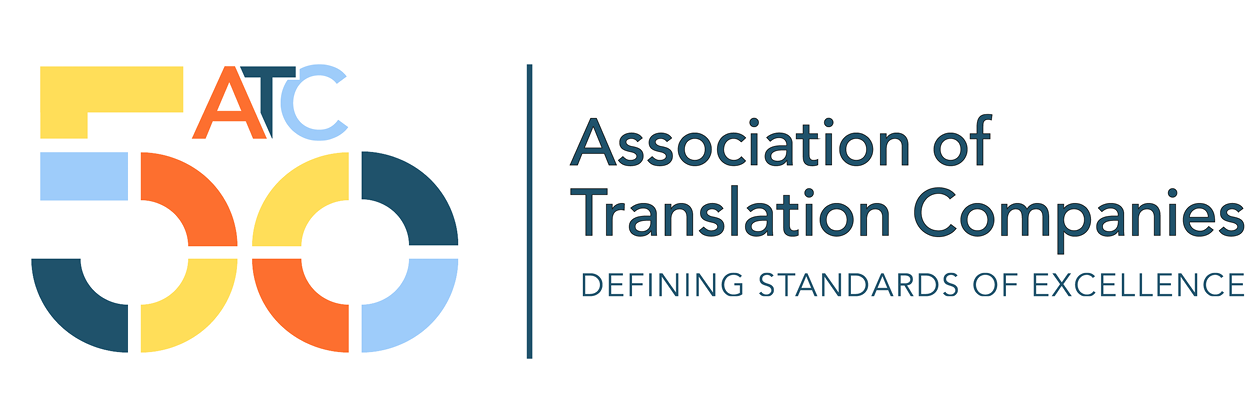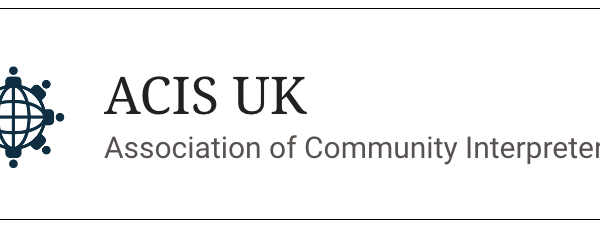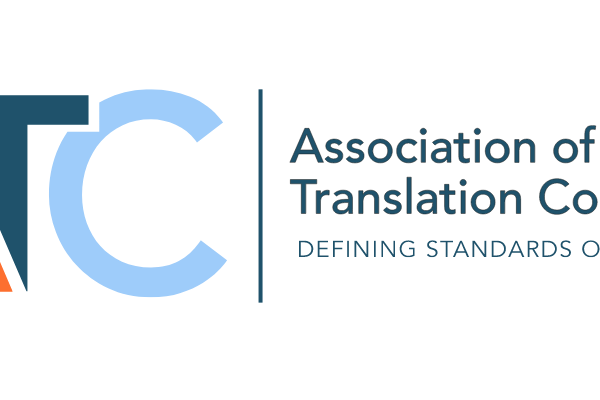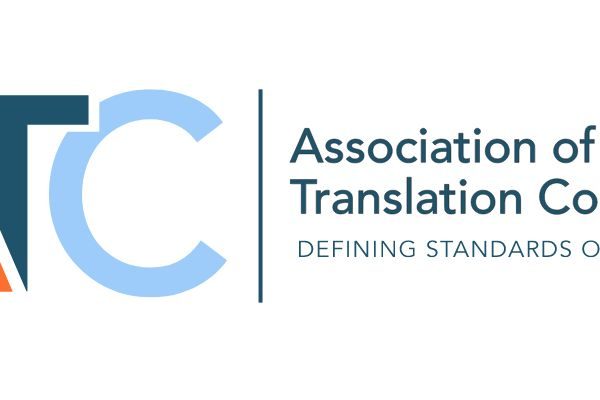The ATC has signed a memorandum of understanding (MoU) with the Association of Community Interpreters…
When asked if the language specialists of today have the skills needed in the future, 47% of participants in a global language industry conversation said ‘No’. In a rapidly changing industry landscape, we still have a long way to go in working out our future direction and the skills we will need to thrive.
Sparking a global conversation
In June 2025, the UK’s Association of Translation Companies (ATC) lit a spark for a global conversation mixing language service company owners and managers, freelance linguists, association representatives, and academics in collaboration with the Canadian Language Industry Association (CLIA), the European Union of Translation Companies (EUATC), and the European Language Industry Association (ELIA).
In all, 63 active participants from a group of language service company owners and managers, freelance linguists, association representatives, industry consultants, and academics came together for 170 one-to-one conversations scoping out the future linguistic, technical, and other skills the language service industry will need to continue to facilitate multilingual communication, open up international opportunities, and provide critical services to the society.
Geographically, 40% of the cohort were in the UK, 37% in North America and the remainder in Europe, covering the main current large markets for commercial language services.
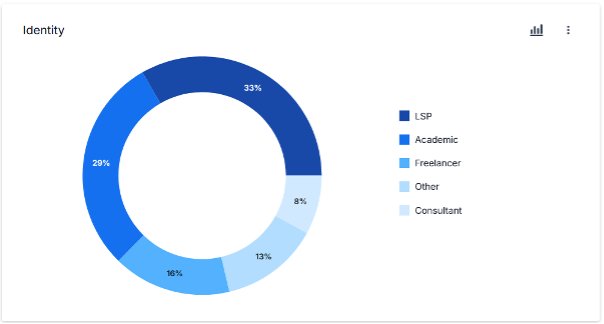
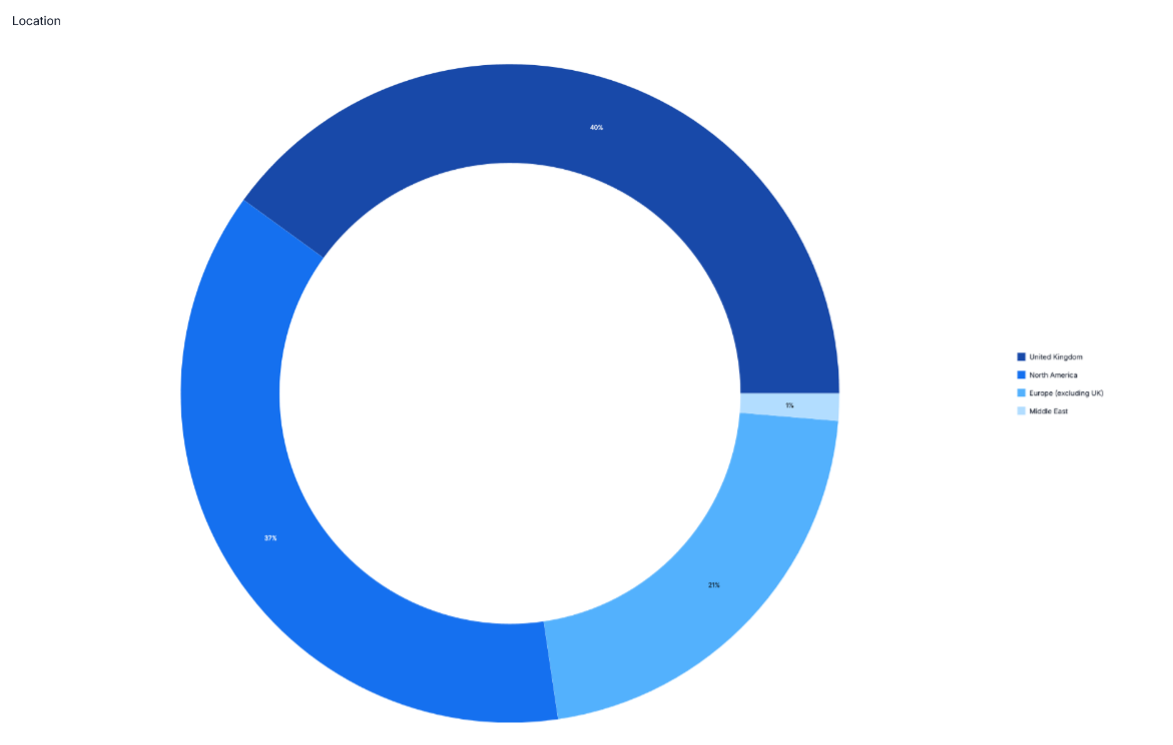
Responding to change, transforming an industry
It doesn’t come as a surprise to anyone in the language services industry that, collectively, we are in a rapidly changing landscape where the sector as a whole is under pressure to adopt new technologies, expand and diversify services, and respond to client requirements.
This is a landscape where Large Language Models (LLMs) and other AI-enabled technology are being increasingly widely used and required, pushing language service companies to adapt their business model, linguists to reconsider and reposition their professional skills, educational institutions to assess the training they provide, and industry associations to support their members as best they can.
In this fast-moving landscape it is difficult to see where AI will take us in the near future let alone in five years’ time. This leaves the language services industry and its professionals slightly adrift when thinking of the skills, services, and career structures of the future.
The aim of our collaborative session was to survey our community, spark a discussion, and take the first tentative steps towards defining a foundation for the skillsets needed in the language services industry of the future. This work is a global effort, with 97% of participants seeing the future skills conversation as a global issue, with the majority also identifying a need for local flavour.
So what about future skills?
As a vehicle for capturing meaningful insights from a total of 35 hours of one-to-one discussions where participants were connected to three different people for three different conversations, the ATC teamed up with an innovative AI-powered software Natter, using the tool to seek answers to pertinent questions about the future skills needs in our sector whilst also trialling Natter as one of the first associations globally to enable conversations and crunch transcription data to draw out patterns.
When asked if they thought the language specialists of today had the skills needed in the future, a significant 47% of participants said ‘No’, 28% ‘Don’t know’, and only 25% ‘Yes’.
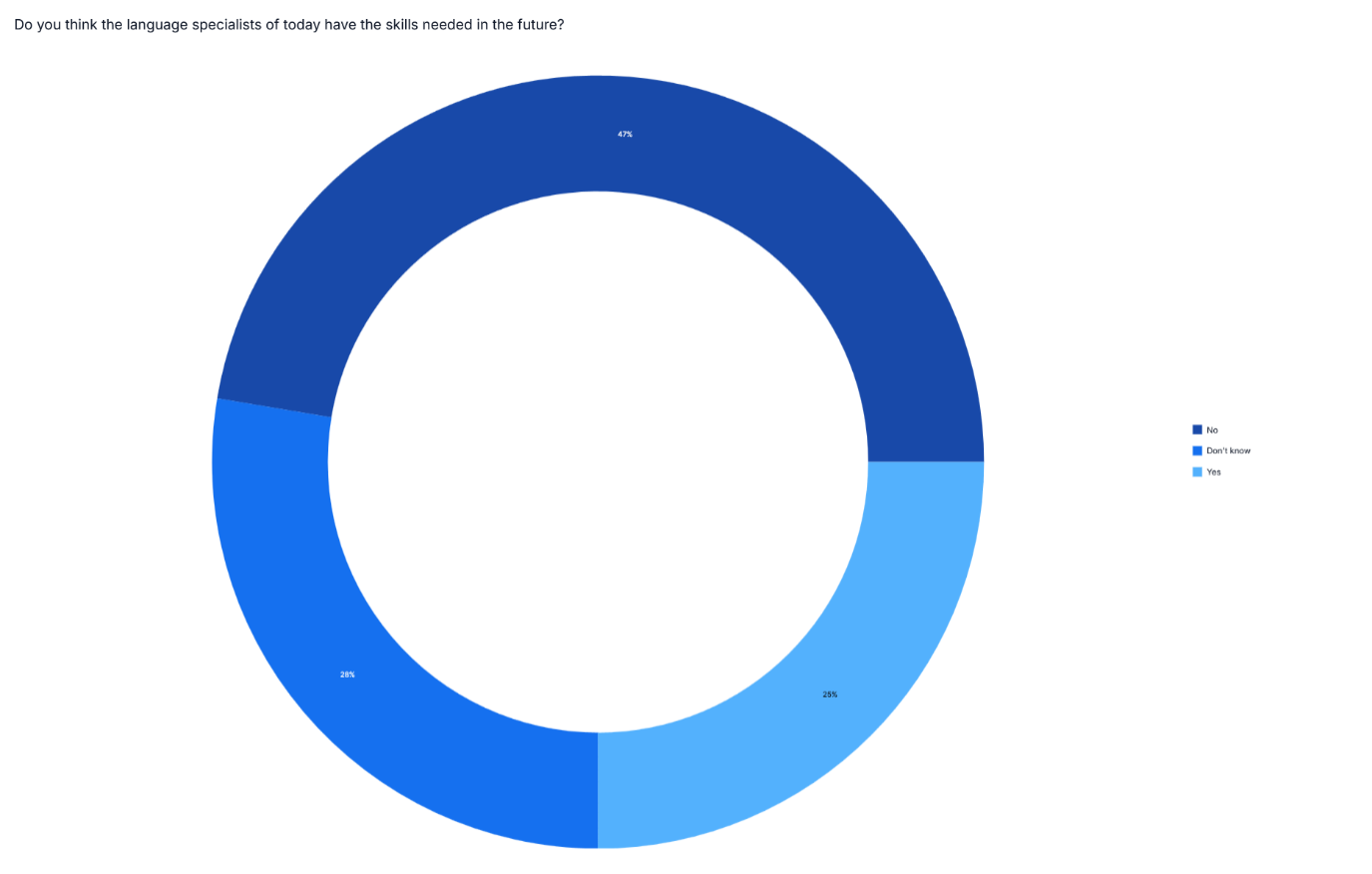
This demonstrates that, as a sector, we still have a long way to go in working out the future direction, and to embrace and adopt AI-enabled technologies. From our balanced mix of industry professionals, 20% declared themselves as ‘not so confident’, ‘not at all confident’ or ‘somewhat confident’ with AI, which means only 21% classed themselves as ‘confident’ and 4% as ‘extremely confident’.
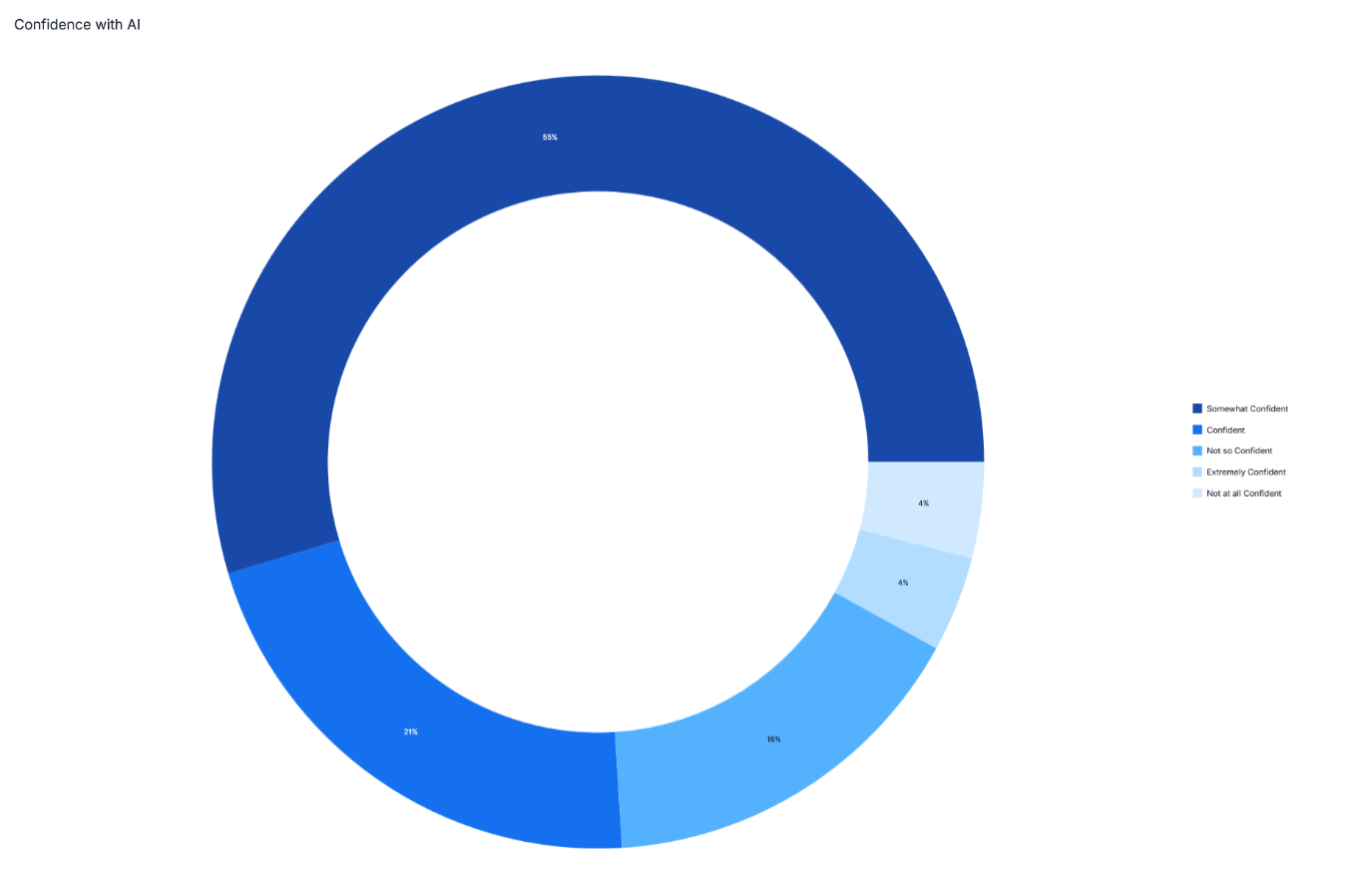
Within our Natter conversations, participants were paired up with people from different backgrounds, geographical locations, and professions to discuss three key areas around future skills: technological, linguistic, and other skills. The below graphs showcase the frequency of skillsets mentioned within these conversations from the entire group of attendees.
Technological skills
The first set of conversations focused on the technological skills we will need and the role they will play in the future.
Within technology, the skills most often mentioned in the participants’ free-flow conversations as captured by Natter were related to IT and digital proficiency and mastery of AI and generative technologies, but also the interpersonal and communication skills that users of sophisticated language technology will need in the future.
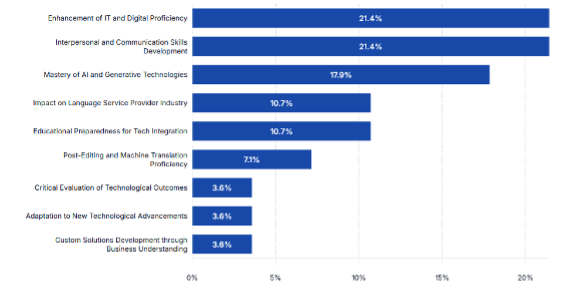
Linguistic skills
Our second set of one-to-one conversations focused on the linguistic skills of the future, which highlighted the strong continued need for integrating technology in language learning, core linguistic competences, and skills around technology for language enhancement.
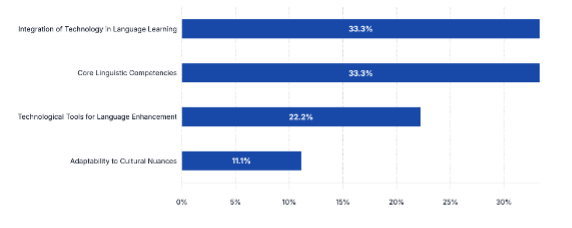
And all the other skills
Amongst other skills identified by the participants were those relating to AI and machine learning integration as a significant obvious area, but also the soft skills around critical thinking and problem solving, data privacy and ethics, technical proficiency in language tools, and knowledge engineering.
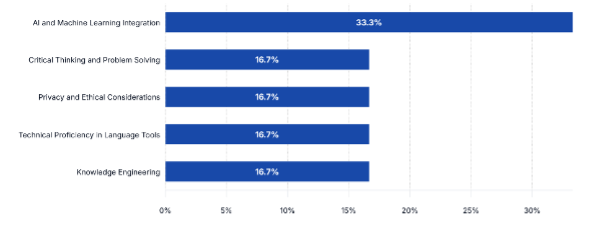
Skills ranked
When asked to rank the skills that will keep the language services industry of the future thriving, the conclusions clearly show core language skills to be of greatest import, followed by technology skills, communication skills and transferrable soft skills.
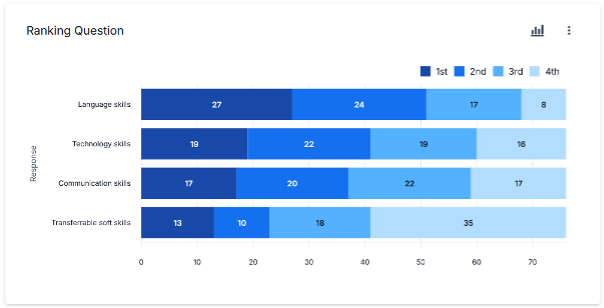
AI Summaries and Beyond
As a tool developed for capturing diverse voices and giving all participants an equal platform, Natter performs a statistical analysis of conversation transcriptions and draws out repeated themes cited by participants.
The AI generated overview summarises statistically significant key themes, and while the summaries are broad brush overviews, the real gems of insight are revealed when you drill down into the specifics. These presented AI-generated summaries of the content of each of the conversations, plus summaries of key themes Natter selected as being worthy of mention.
The quotes given are also a summary of the actual content of the transcripts in the form of conflated content within the raw text, but they are not actually verbatim quotations from any one speaker. This means they are often more readable and coherent than the raw text content, but it also means they cannot be traced back to a single speaker. The tone of these statements often infers a far greater degree of certainty than is actually expressed by the speakers, most of whom are rather tentative in their propositions in the raw data.
For this reason, and in order to identify the outlier ideas, the blue-sky thinkers, and the uncommon innovations, we followed Natter’s AI summary with a brief overview of comparative outcomes from a human corpus-based keyword in context (KWIC) reading of key terms.
KWIC corpus analysis
Using the full extent of transcription data, we used SketchEngine to generate a list of Key Words and Key Phrases. In answer to the key questions, the outcomes closely followed Natter’s findings, with language skills rated above tech, communication and other soft skills.
These are some of the most inspirational direct quotes from our participants:
On language and communication skills
“But […] I was at something else recently. It was actually a demonstration on using various AI tools to extract terminology for working as an interpreter. The […] issue remains that unless your language skills are good enough […] you cannot depend on extraction because, at the moment anyway, you just cannot be 100% sure that what is being extracted is accurate.”
“And one of the things I basically conclude is how important, the language and the communication skills are. Because if you don’t have two languages and if you’re not properly trained, then you’re not employable.”
On tech skills
“This technical expert is quite a scary thing for a lot of people then to our industry, because a lot of people are linguists in training. They have this love of languages, they’ve not necessarily got a lot of […] high stakes technical skills . They come into the industry and the idea that they need to have this really strong digital literacy is quite scary. I think really it’s about having a curiosity and an open mindedness and having adaptability.”
“Future linguists will need to integrate these tools into larger tech enabled ecosystems, understanding APIs, automation scripts, and cloud-based environments […] collaboration with AI rather than competition […] some neural machine translation, generative AI, speech to text tools.”
On communication skills
“So we have to also empower our students about this aspect, and we have to work on how to effectively communicate with AI, never forgetting that it is not human and does not possess human abilities and human cognition. So I think the communication skills should further, you know, include that aspect as well.”
“And then there’s the AI part, which I believe will draw on our communication skills . The minute we learn to prompt properly, we can become very efficient.”
On transferable skills
“So I think those transferable skills , those human skills, those communication skills are very, very important […] alongside the tech skills, which will change and mutate massively rapidly over the coming years, I’m sure.”
“Adaptability, teaching flexibility as well because not many language service providers are really flexible. When you are in a domain, you stick to that […] we will have to be flexible and and hone some transferable skills to be […] up to the task. You need to keep, learning and get yourself up to date.”
“In a management class […] I teach them how to create workflows, how to manage projects. So we I teach them about all their skills, transferable skills, transversal skills.”
Outside the topic of the key questions, a human reading of the discussion transcripts gave a more detailed and nuanced understanding of the discussions between participants. A reading of the connotations present in 4,000 plus segments relating to the term ‘skills’ for example, gave an overwhelmingly positive impression of attitudes within the research cohort to dealing with future challenges, demonstrating a ‘can do’ attitude to the work ahead.
Meanwhile, a reading of the KWIC findings for potentially controversial terms such as: ‘nuance’, ‘trust’, ‘ethics’, for instance, provided some insight into reservations about the advent of AI and its impact on working practices and experiences in the sector.
On nuance
“And as you say […] we can add that nuance that is important. That no machine, I think, no matter how much you train them because, again, I know we call it AI, so artificial intelligence, but I think we should not forget there’s not intelligence. It’s algorithms.”
“And I think the linguistic skills that translators and interpreters have in terms of understanding the nuances, understanding the intention of the speaker, and also understanding the mindset, this is something a machine cannot do. So these linguistic skills, in my opinion, will continue to play a critical role.”
On trust
“But, you know, you can get so far and not further, and that’s continually shown to me by whatever examples, you know, we see of of fails from AI that […] it’s massively risky and can’t be understood it can’t be trusted a 100% of the time.”
“And I suppose I think that the big thing now is teaching students how to use GenAI ethically, sensibly, and responsibly. So I think that’s quite a big one because we’re seeing with with oh, just the the trust in these tools is implicit, and it’s not critical. They’re not using them that critically.”
“So maybe marketing teams start doing translation internally […] They might become trusted advisers on culture, on marketing, on global marketing, for example, which, again, the culture awareness piece is so important there.”
“And so they get to see his face and his smile. […] And so it’s it’s about building trust. People connect with other people, not with machines. I mean, not in the same way.”
On ethics
“I think ethics, I mean, ethical and intercultural sensitivity will be very important as well. Being able to navigate ethical gray areas, uphold quality and inclusivity standards, mediate across cultural boundaries […] but also being able to spot bias in language, I think it’s it’s and then that comes with critical thinking and being able to analyze language behind or or just read and listen between the lines.”
“So, I think we can and cannot be replaced. AI doesn’t have empathy, doesn’t have ethics . Those are human beings’ qualities which we cannot ask AI to have, in my in my opinion.”
“A lot of people are gonna have some piece of that IT person’s job where you have to worry about the ethics and security and privacy, and you have to ask those questions of, well, if I use this technology, am I violating something?”
Conclusions and a tentative way forward
A new, inclusive way of capturing the language service industry’s diverse professionals’ views in a collaborative environment was a useful session for most participants: 60% reported that the session had clarified their thinking about future skills in the sector, 22% were unsure and only 18% thought it had not.
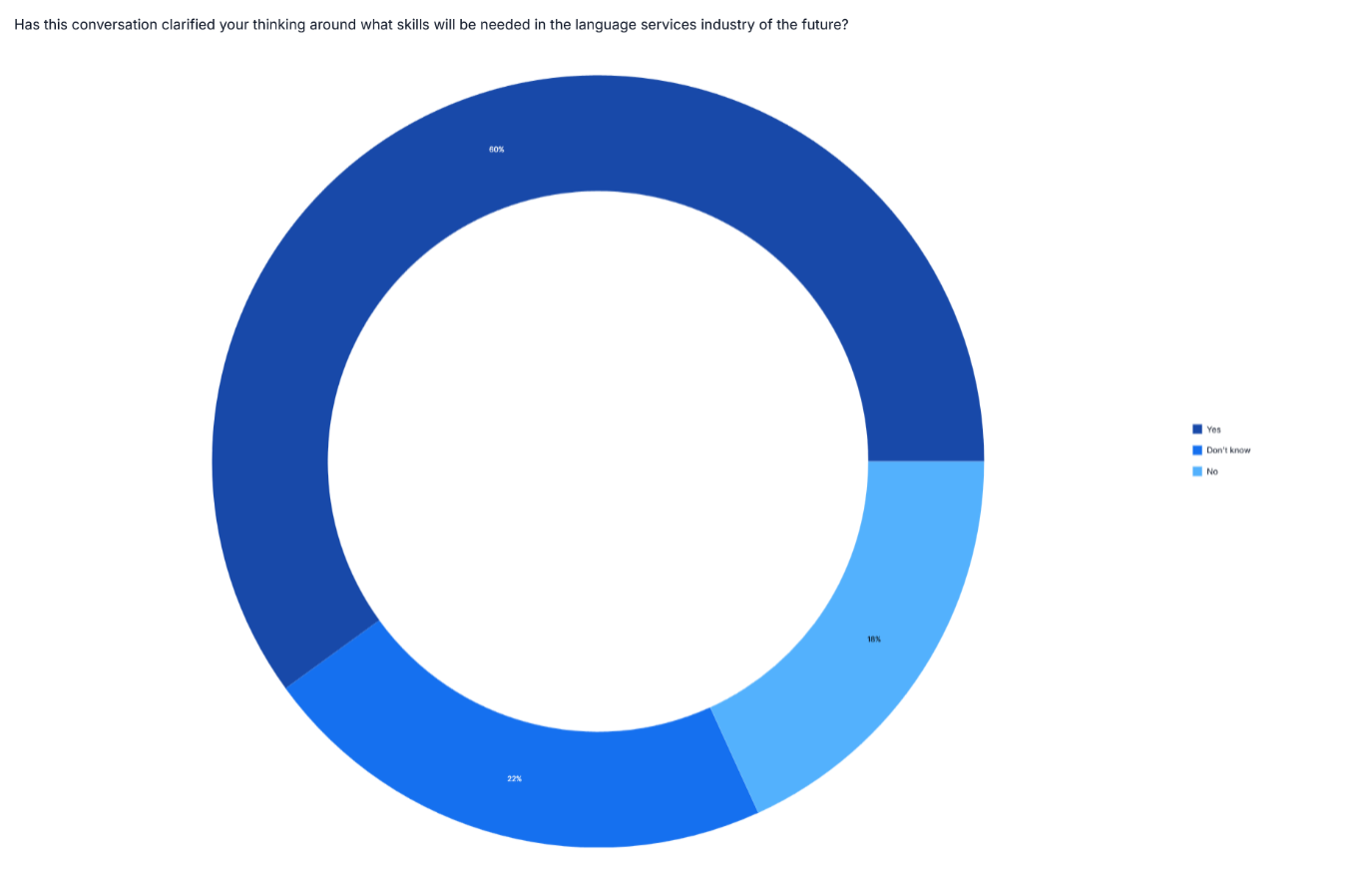
When asked who should be training the next generation of professionals, our cohort were divided: 34% felt this should be the universities; 25% the Language Industry Associations; 22% Training Providers, and; 19% Language Service Companies (LSCs). This could, of course, mean that universities will remain best for teaching languages themselves, but that sector associations, independent providers and LSCs would be best placed to provide training on the actual sector and AI tools.
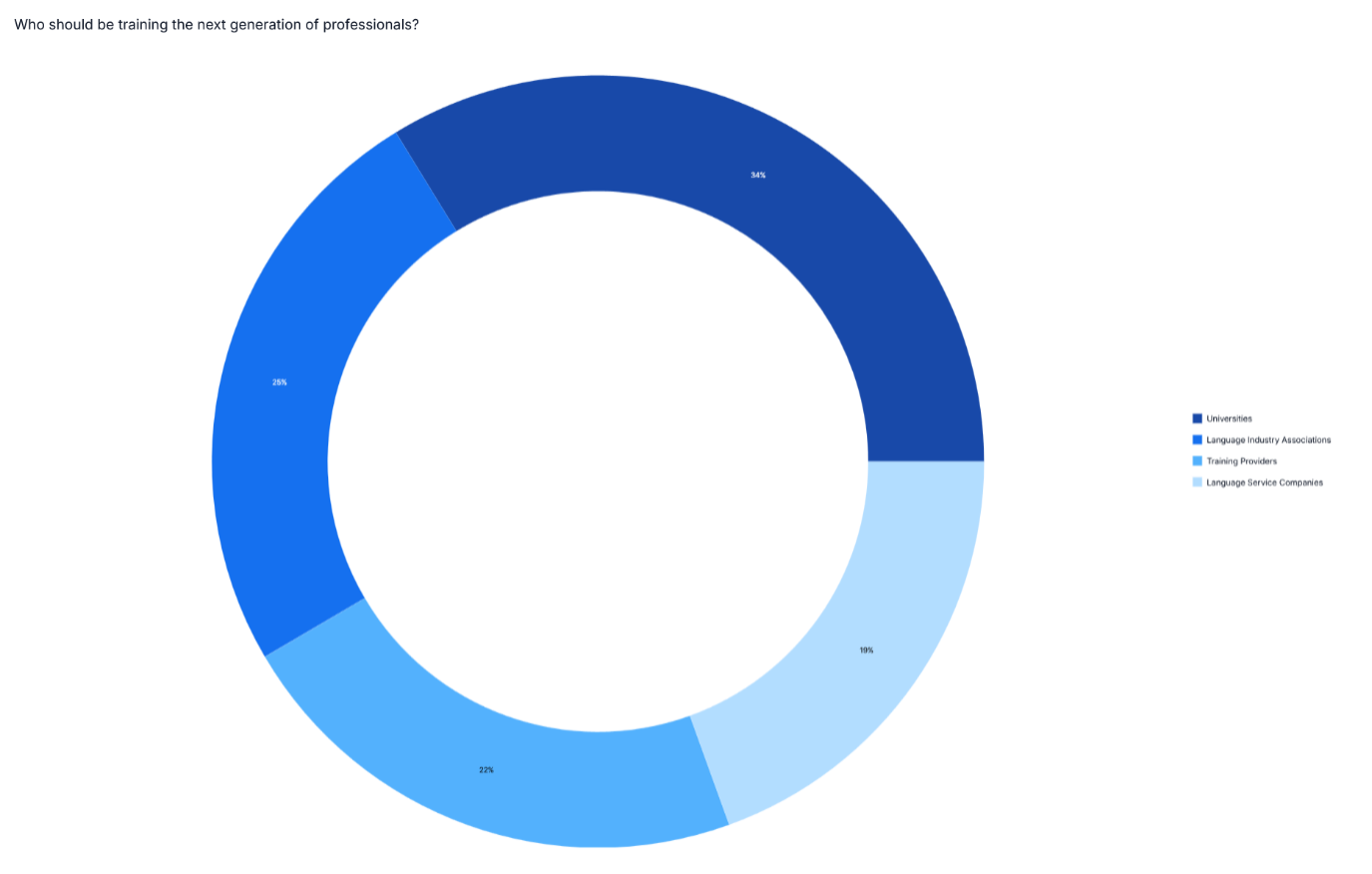
The top ten suggestions for our collective next steps on the journey to discover future skills were the following:
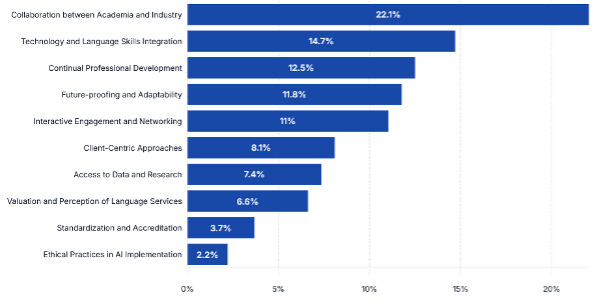
Our participants represented a wide range of professionals all in the same virtual room, which gave us a clear picture of how various sub-sectors are projecting skills needs in the future. However, to genuinely have a better-informed gaze into the crystal ball it would in the future be helpful to have more input from people already closely working with AI solutions to see where the future opportunities are for language specialists, data analysts, and communicators.
On 19 September 2025, the ATC in collaboration with Magic Beans Agency, the Association of Language Companies (ALC) in the US, and CLIA in Canada, will launch the third iteration of our popular AI Upskilling Course Reclaim 3.0 which responds to LSCs’ need for more interactive engagement and peer networking, and aims to support language service companies in their strive towards continuous professional development and upskilling of their staff.
It is also clear that there is a continued strong call for academia-industry collaboration, and our journey towards more concrete outcomes continues with a workshop on future skills by the ATC’s Commercial & Collaborations Lead Sarah Bawa Mason at the APTIS25 Online Conference at the UCL Centre for Translation Studies on 3-4 November 2025.
Sarah Bawa Mason & Raisa McNab, Association of Translation Companies, 2025
